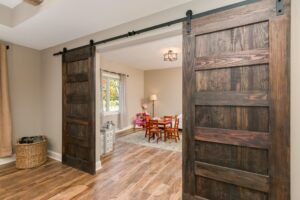Remodeling with a Low Basement Ceiling
Updated May 4, 2022.
All basements are not created equal—even the unfinished ones! If you are currently scoping out the possibilities in your unfinished basement, you may notice irregularities like missing mechanicals or a lower-than-normal ceiling height.
When discussing your basement finish, one of the first questions is how high your basement ceiling is. We often see lower-than-normal basement heights in older homes but occasionally do see them in newer homes. Depending on where you live (as we service Denver, Minneapolis, and West Chicagoland), your neighborhood may have code restrictions on how high your ceiling must be to complete a basement remodel.
You can rest easy knowing that FBC Remodel’s inspection and planning process will help you identify any potential issues before starting your remodel. In the meantime, you can use our quick guide to assess your ceiling height and see what options are available to bring your basement up to code.
Basement Ceiling Requirements Depend on Your Area
As we mentioned, FBC Remodel has locations in the Denver metro area, the Minneapolis-St. Paul metro, and the Naperville, IL, area. Each state has individual code requirements, including the height your basement ceiling must at the end of your remodel.
Please note these are general rules of thumb, and each jurisdiction within each major city is subject to change.
If you live in the Twin Cities, you can’t have an obstruction below 6’4’’. If there is an obstruction, your basement can be finished but will be deemed uninhabitable meaning you won’t be able to add bedrooms to the space. Stairs to your basement also have to have the same minimal clearance of 30” and a 36’’ landing.
If you’re a Naperville or West Chicagoland homeowner, the rule of thumb for a pre-1980 home is a 6’8’’ ceiling height for a habitable basement space. If your home was built after 1980, a 7’0” ceiling height is required for a livable basement, but a 6’8’’ ceiling height is allowed in non-habitable spaces. Stair compliance can also come into play; however, if your remodel does not involve direct work on the stair geometry, they can remain as-is regardless of whether they meet code requirements.
In the city of Denver, homes built before 1990 will be required to have a minimum finished ceiling height of 6’8’’ to be able to pull a permit. Homes built after 1990 have a required finished height of 7’0’’. The ceiling can be as low as 6’4’’ below HVAC ducts and pipes as long as the rest of the space meets the required height of 6’8”.
These are general requirements for large metro areas. If you live on the outskirts of your city, these rules may differ. We recommend searching basement code requirements in your area and consulting with your remodeling partner to inspect the space. If any of these height requirements are not met, your basement will require a dig down to pull a permit and complete your project.
What if My Basement Is Too Low? Can I Remodel?
We get this question a lot, especially from homeowners in older homes with low ceilings. You can still finish your basement, but your remodeling partner will have to bring your basement up to code by getting your ceiling to the required height. This step will often require a dig down if your basement is low.
A dig down consists of digging into your basement floor to create additional floor-to-ceiling space. A dig down will impact the overall cost of your remodel. Depending on your location, a dig down can run from $30-$75 and up per square foot. Make sure to include this additional cost while planning your basement design. The final dig down cost can vary depending on mechanicals and parts of the space you need to expand.
How FBC Makes Basement Remodeling Easy
As you can probably tell, there are a lot of inspection elements in play to ensure your new basement is not only beautiful but also meets the code requirements in your local area. When you work with FBC, we complete all permitting and inspections on your behalf. Throughout your design consultation and first project manager meeting, we’ll walk the space and point out any issues that may delay construction or add cost to your project.
FBC’s proven process ensures no detail goes unchecked. Not only do we discuss your ceiling height in your first call with our design coordinator, but you’ll also have a designer personally come to your home, measure the space, and note any immediate needs. Your dedicated construction project manager will also walk your area and report any potential issues before moving forward with our process and putting down a deposit. We’ll help you find the right partner to complete that dig down before you remodel your basement with us if a dig down is required.
Remodel Your Basement with FBC Remodel
FBC Remodel has been finishing and remodeling basements since 1997. As your trusted local design builders, we ensure that no detail goes overlooked. In addition to a construction and build process that puts you at ease, we will bring your dream basement to life through our incredible custom designs and quality craftsmanship.
Have questions about your ceiling height and what’s needed for your remodel? Take a moment to measure your floor to ceiling height and give us a call today to chat with our Design Coordinator about your project. We can’t wait to show you what’s possible in your home!






